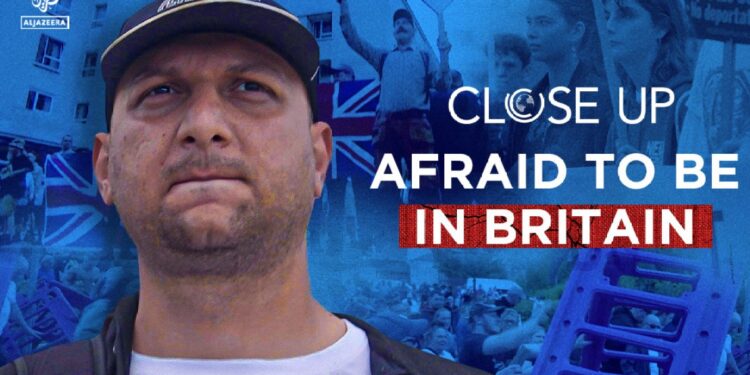Unsettled by riots, asylum seekers in the UK fear hostility, racism and violence in the land they hope to call home.
When Iran was rocked by its biggest ever protests against clerical rule, 28-year-old Azad was among the demonstrators demanding change. Two years on, he’s living on a barge in southern England, apprehensive about stepping onto dry land for fear of being attacked.
Azad, not his real name, was one of thousands in Iran who took part in protests following the death of Mahsa Amini, a Kurdish woman detained for allegedly violating mandatory dress codes. But when Iran began jailing and executing people who participated, he fled. He sought asylum in the United Kingdom, believing he would be safe in a Western nation that had condemned Iran’s government, imposed sanctions and championed the protesters’ cause.
But instead of finding relief, Azad is gripped by a sense of dread. He had not anticipated the xenophobia and anti-refugee sentiment that so violently erupted at the end of July when riots, fuelled by misinformation, targeted migrants, Muslims and minority ethnic groups.
“When these protests happened, I just thought, so what can we do now?” Azad recounts. “You don’t have any place that you belong. You don’t have any place to go. It was really scary.”
Britain’s worst unrest in a decade was triggered by a tragedy: a man stabbed three girls to death, aged between six and nine, while they were attending a Taylor Swift-themed dance class in the town of Southport. False rumours quickly spread online that the Welsh-born perpetrator was actually a Muslim migrant, and deep-seated racial tensions were ignited. Thousands of English nationalists and supporters of the far right rampaged through cities across the UK, smashing Muslim-owned shops, clashing with police and, most concerningly for Azad, attacking places where asylum seekers are housed.
Azad lives in asylum accommodation described by campaigners as “quasi-detention”, on board a controversial migrant vessel called the Bibby Stockholm, an engineless barge moored on the Isle of Portland in the English Channel. It didn’t come under attack during the riots, but Azad was so concerned by the possibility that he packed his bags and was prepared to flee again.
“We cannot go back to our country. People don’t want us here. What will happen to us?” he asks, reflecting on the precarious situation many would-be refugees find themselves in.
This Close Up documentary features rarely seen footage from on board the Bibby Stockholm barge, as Azad gives a tour of his waterborne accommodation. The film crew then follows Azad as he ventures out, despite fears of a racially motivated attack, to attend a pro-refugee protest in the nearby town of Weymouth.
On the way, the camera captures a hostile encounter with a local resident who believes the UK has taken in migrants to the detriment of British citizens, exclaiming, “Too many boats, shoot ‘em on sight.”
Despite the hostility, Azad remains hopeful he’ll gain refugee status and be able to begin afresh in the UK. “If I get the chance to talk to people who hate asylum seekers, I’ll tell them, I’m sorry we are here, if we could be any place else, we would be.”
Credits
Director: Ana Gonzalez
Camera: Alex King
Editor: Lidia Ravviso
Producer and Video Editor: Antonia Perello
Sound Mixer: Yago Cordero Domenech
Colourist: Catherine Hallinan
Senior Editor: Donald Cameron







